September 16, 1909: Tigers @ Athletics
This story doesn't start the day of the game but rather almost a month earlier - August 24, 1909.
- The Philadelphia Athletics came to Bennett Park in Detroit leading the Tigers, their fierce rivals, by one game in the American League standings thanks to a five-game winning streak.
- The A's scored two in the top of the 1st. In the bottom of the inning, Ty Cobb walked with two outs, then stole 2nd. He attempted to steal 3rd as Sam Crawford took ball four.
- C Paddy Livingston threw Cobb out by a large margin, but Ty's spikes cut 3B Frank Baker on his inner forearm about three inches above the right elbow. The Detroit Free Press reported: "Baker was aggrieved, regarding the injury as premeditated." Frank stayed in the game with a small plaster dressing over the wound and would play every inning of the three-game series.
- Cobb smacked a two-run double as part of a four-run outburst in the 7th that sent the Tigers into a 7-5 lead. As the throw came in from the outfield, Cobb knocked 2B Eddie Collins head over heels while sliding into the bag. The Free Press noted that Collins was in the baseline while receiving the throw. Eddie made no appeal to the umpire.
- Detroit held on to win 7-6 to tie the A's for first place.
Athletics' manager Connie Mack angrily (and uncharacteristically) criticized Cobb in his postgame remarks.
- "Cobb is the greatest ball player in the world, but he is also one of the dirtiest. He boasted before the game that he would get some of the Athletics before the game was over, and he made good by spiking Baker and all but cutting the legs off Collins. … Such tactics ought to be looked into by the American League, and I intend to see to it that the matter is taken up. … [Cobb] may be a great player, but he is a pinhead in this respect. Organized base ball ought not to permit such a malefactor to disgrace it."
- The Tiger great defended himself, stating that the spiking was unintentional: “Mack knows that I have never spiked a man deliberately, and he also knows that the runner is entitled to the line, and if the baseman gets in his way, he is taking his own chances. When I slid, I made for the bag. If the man with the ball is in the way, he is apt to get hurt. But that is his lookout, he has no business on the line.”
AL President Ban Johnson decided to join in the discussion.
- “There’s been altogether too much of this sort of game at Detroit, and somebody is going to be made a shining example of if I hear of another such affray. Cobb seems to be the chief offender, and a word of advice should go a long way. He must stop this sort of playing or he will have to quit the game.”
- Despite the cloud of a possible suspension of their star player hanging over them, the Tigers swept the series to take a two-game lead.
- However, the Athletics still led the season series between the two clubs, 11-7.
Free Press photographer William Kuenzel checked the photos he had taken during Game One of the series and found one that seemed to settle the question of whether Cobb had spiked Baker intentionally.
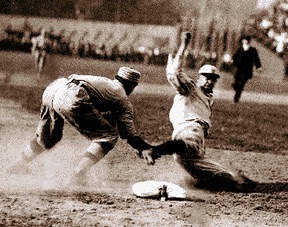
Frank Baker tags Ty Cobb at 3rd August 24, 1909.
- The photo, one of the most famous baseball pictures of all time, shows Baker reaching for Cobb while Ty, a practitioner of the hook slide, tries to avoid the tag.
- Cobb felt vindicated by the photo. “This picture plainly shows that I did not spike Baker intentionally. … Baker is mighty nice about it and said yesterday that he did not think I tried to spike him intentionally. He looks at it as an accident and lets it pass at that. Connie Mack, naturally sore at losing to us, is inclined to look at the matter more seriously as he naturally would, being a hard loser.”
- Johnson backed off his earlier statement. He now said that, if Cobb had violated any rules, the umpires would have settled the matter at the time.
Less than two weeks after the Baker incident, Cobb made the headlines again, this time for a nasty, violent off-the-field incident.
- Arriving at the Hotel Euclid in Cleveland late at night, Cobb was told by the night elevator man, an African-American, that no elevators ran after midnight.
- Not liking the man's attitude, the Georgia Peach slapped him across the face. George Stansfield, the African-American night watchman, came up. When a shouting match ensued, Stansfield hit Ty with his nightstick.
- The Detroit star pulled out a knife and slashed the watchman in the ear, shoulders, and hands as Stansfield continued to hit him with his nightstick.
- When Stansfield pulled out his gun, Cobb knocked him down and kicked the gun away. Then he kicked Stansfield in the head repeatedly until the desk clerk and several janitors managed to pull Ty off the badly injured night watchman.
- Cobb retreated to his room and bandaged his wounds. The next day, he played all 18 innings of a doubleheader in bandages stained with blood.
Detroit finished the series and left Cleveland before news of the fight made the newspapers.
- Lawyers for the Tigers managed to get Cobb's charge reduced from felonious assault to just assault and battery.
- Stansfield settled his civil lawsuit against Cobb out of court for an undisclosed amount.
The Tigers held a four-game lead over the A's as they began their last road trip of the season in Philadelphia Thursday, September 16.
- The citizens of The City of Brotherly Love did not live up to that motto as regards Ty Cobb. They had not forgotten what Cobb had done to Baker and Collins. And the photographic evidence that Ty had not spiked Baker intentionally had not made its way to Philly.
- Ty received death threats. People threatened to shoot him from the stands if he took the field.
- Detroit manager Hughie Jennings wanted to keep Cobb on the bench, but Ty wouldn't hear of it. So the Tigers requested police protection for their rightfielder.
As the Tigers left for Philadelphia, Ty wrote a letter to the sports editor of The Macon (GA) Telegraph:
" I think we will get the best of the Athletics in these games, and Manager Jennings thinks so too. Take it from me, ... our Tigers are going to win again. We just can't be beat now, that's all. I expect some personal trouble in Philadelphia, as they have it in for me, because they think I spiked Baker, which I didn't do. He stuck his arm in the way in trying to tag me as I slid into third, and that is all there is to it. As regards the trouble at Cleveland with the hotel hall-watchman, that has been settled, although the Cleveland papers are trying to have me indicted. He butted into my affairs and then assaulted me and in self-defense I cut him with my pocket knife, although I didn't want to do it.
Manager Connie Mack's remarks about Cobb in Detroit unintentionally had the effect of making money for owner Mack from increased attendance for the Detroit series in Shibe Park, which had opened that season.
- The reception at various stops as the Tigers traveled by train from Detroit through Buffalo to Philadelphia illustrated the widespread interest in the upcoming series. At every station, many fans, mostly boys, came alongside the car to cheer Cobb. For the most part, the talk was "in the joshing strain, and the team was well received."
- A's President Ben Shibe and Tigers manager Hugh Jennings called on the Philadelphia Director of Public Safety Henry Clay for an "extra force of policemen." They showed the director many letters threatening players on the Detroit team, Cobb in particular. Clay granted the request, ordering 200 policemen to the stadium. The Superintendent of Police, ten lieutenants, and ten sergeants would be part of the detail, with 25 detectives scattered through the crowd. Clay himself would be on hand to oversee the force.
Clay issued this statement to the press: "I am a believer in fair play, and I will see that order is maintained, and that Cobb and the other Detroit players are protected both on and off the field. I have read all that has been printed on the subject of Cobb's alleged attack on Baker and I realize that the minds of the local baseball partisans may be inflamed and I will therefore give my personal attention to the welfare of the Detroit team while in our city."
- For the first time in AL history, the Detroit club dressed at the stadium rather than travel from the hotel in their uniforms in carriages or automobiles.
Mack had included a visiting team dressing room in the new Shibe Park that was the finest in baseball. It included showers and other conveniences. So the Tigers could shower and dress in the stadium afterward, giving the crowd time to disperse.
- The turnstiles opened at 12:30, and almost all the fans in the crowd announced at 24,710 were in the stadium a half hour before the 3:30 first pitch.
Large numbers stood behind the ropes that were stretched across LF and RF. The crowd congregating in RF within a short distance of Cobb's position in RF was larger. So that was where the bulk of the police were stationed.
- Rain fell downtown but only a slight amount at the ballpark. Soon, however, the rain increased, causing the groundkeepers to cover the plate and mound. But the sun soon came out just before the Tigers arrived at the park amid a torrent of boos. But the rain soon returned and would fall off and on throughout the contest.
- No soft drinks were sold to prevent spectators from using empty bottles as projectiles.
Umpires Silk O'Loughlin and Bull Perrine would be entrusted not only with calling the game but controlling the intense players and fans.
- O'Loughlin brought a unique style to his craft. He originated the loud calling of balls, strikes, and outs. Years later, fellow umpire Billy Evans would say that "Silk was a bundle of nerves. From the start of the game until the finish, he was on edge. Baseball was a serious proposition for him."
- Perrine was in his first year in the American League. Earlier in the '09 season, he needed a police escort from the field after working an Athletics-Red Sox doubleheader in Boston.
The same day the big series opened in Philly, the President of the United States, former C William Howard Taft, attended the Giants-Cubs game at West Side Park in Chicago. AL President Ban Johnson, whose office was in Chicago, attended along with NL President John Heydler and National Commission chairman August Herrmann. An estimated 30,000 fans crammed into the stands and lined the outfield fences.
Also, the inning-by-inning progress of the game in Philadelphia would be posted on the scoreboard at National Park in Washington where the Senators hosted the St. Louis Browns in a doubleheader.
|
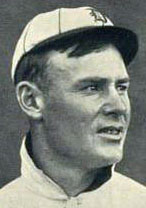
Sam Crawford
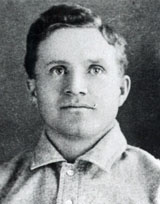
Paddy Livingston

Frank Baker
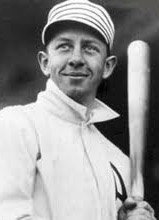
Eddie Collins
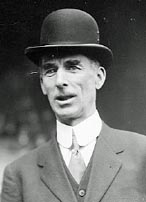
Connie Mack
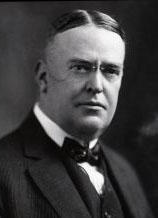
Ban Johnson
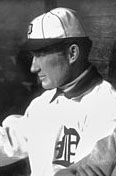
Hughie Jennings
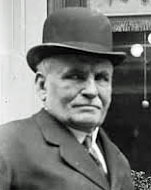
Ben Shibe
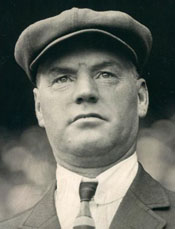
Silk O'Loughlin
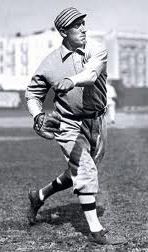
Eddie Plank
|

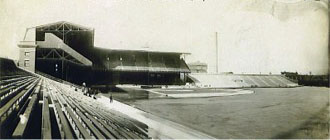
Two views of Shibe Park, which opened at the beginning of the 1909 season
Starting Lineups
Batting Averages at game time
Detroit Tigers
| Matt McIntyre |
LF |
.239 |
| Donie Bush |
SS |
.277 |
| Ty Cobb |
RF |
.363 |
| Sam Crawford |
CF |
.313 |
| Jim Delahanty |
2B |
.238 |
| George Moriarty |
3B |
.269 |
| Tom Jones |
1B |
.257 |
| Oscar Stanage |
C |
.273 |
| Ed Summers |
P |
18-7 |
|
 |
 |
Philadelphia Athletics
| Heinie Heitmuller |
LF |
.273 |
| Jack Barry |
SS |
.216 |
| Eddie Collins |
2B |
.356 |
| Frank Baker |
3B |
.289 |
| Harry Davis |
1B |
.267 |
| Danny Murphy |
RF |
.276 |
| Rube Oldring |
CF |
.216 |
| Ira Thomas |
C |
.221 |
| Eddie Plank |
P |
17-9 |
|
|
1st Inning
2nd Inning
- CF Sam Crawford drew a base on balls.
2B Jim Delahanty sacrified the runner to 2nd.
3B George Moriarity fouled to 3B Frank Baker.
CF Rube Oldring tracked down the fly off the bat of 1B Tom
Jones to end the mild threat.
- Summers set down Harry Davis, Danny Murphy, and Rube Oldring in order.
3rd Inning
- Plank had to work his way out of a jam.
Oscar Stanage singled cleanly to LF.
Summers' sacrifice attempt failed when Plank forced the runner at 2nd.
McIntyre singled to LF, the runner stopping at 2nd.
The last thing Eddie wanted to do was walk Bush to load the bases for Cobb. But that's exactly what he did.
With a chance to do damage, Cobb fouled off several of Plank's crossfire deliveries. With the count 3-2, the game's leading hitter fanned to the great delight of the fans, who applauded wildly.
One reporter wrote: "The demonstration was the greatest ever seen at a ball game here." Another wrote, "The crowd yelled itself hoarse." Several straw hats flew onto the field.
Another description read like this: "Cobb walked back to the bench in apparent disgust. This pleased the crowd immensely and they cheered wildly. Cobb didn't know just how to take it; at first he was inclined to make faces, puckering up his nose as he turned to face the crowd. He slunk back to the bench ... and didn't show himself again until it was time to trot out to his place in the outfield."
But the threat was not over, especially with Crawford stepping in. But Plank coolly finished off the inning by getting Wahoo Sam to tap to 1B Harry Davis, creating another roar from the multitude.
- Another 1-2-3 inning for Summers, who was pitching better than his mound opponent at this point.
At the end of the inning, Murphy, stranded at 1st, took exception to a remark that Dave Jones hurled at him from the Detroit bench. Danny ambled over and made a lunge at his tormenter, Charles "Boss" Schmidt. George Mullin and several other Tigers intervened to keep the peace. Umpire O'Laughlin gave Schmidt a tongue-lashing for trying to incite a fracas.
4th Inning
- After Delahanty fanned,
Moriarity hit a ground-rule double into the crowd in LCF.
Jones grounded to Baker, Moriarity taking 3rd.
The A's walked Stanage intentionally to get to the P.
With a chance to help his own cause, Summers grounded to Barry.
- The A's scored enough runs to win the contest in this inning.
Barry sent "an ugly grounder" to 3B Moriarity, whose wild throw struck the glove of A's 1B Davis that was lying at the end of the "coacher's box." If not for that stroke of luck for the Tigers, Barry would have made it all the way to 3rd instead of stopping at 2B.
1B Jones fumbled Collins', then threw wild past Delahanty covering 1st. Barry came all the way around to score, and Eddie ended up on 2nd.
Baker sacrificed Collins to 3rd, 5-3.
Mack's strategy worked perfectly as the A's 2B raced home on Davis's high bounder to SS Bush.
Murphy kept the inning alive with a single to CF.
Next came a crazy play. Oldring dribbled the ball between the mound and 1B. Jones, Summers, and Delahanty all tried to field the ball. Seeing the confusion, Murphy continued around 2nd toward 3rd. Delahanty picked up the horsehide and fired to Moriarty at 3rd to retire the side.
Athletics 2 Tigers 0
5th Inning
- Both teams went down in order.
6th Inning
- The Tigers finally broke through against Plank, giving manager Jennings, coaching at 3B, some traffic.
Crawford walked on four pitches, then quickly stole second.
Delahanty ambled to 1st after being plunked by a pitch.
After two failed attempts to bunt, Moriarty cracked a liner into RF that looked mighty good when it left the bat. But Murphy made a great running catch a few inches off the ground, then threw toward 1st to double Delahanty. When the ball hit the runner, Crawford advanced to 3rd.
Jones shot a single to CF to drive home Detroit's first run. Delahanty moved to 2nd.
The inning ended abruptly when Stanage smacked a hot grounder toward Baker who made a nice stop, stepped on 3rd, and, steadying himself, fired to 1st to complete the inning-ending double play.
Athletics 2 Tigers 1
- Collins ripped his 27th double with one out but went no further.
7th Inning
- With two out,
Bush doubled to CF.
But Plank again got the best of Ty, inducing a fly to LF.
- Thomas walked with two out.
But Plank struck out.
8th Inning
- The visitors couldn't get a man on.
- Heitmuller opened with a one-base hit to LF.
Barry, Collins, and Baker failed to bring the runner home.
9th Inning
- The inning was played in a drizzle and semi-darkness.
Jones flied to Oldring.
Stanage went out 3-1.
George Mullin, batting for Summers, became Plank's fifth K to end the one hour 48 minute game.
FINAL SCORE: ATHLETICS 2 TIGERS 1
Postgame
- When the game ended, a cordon of policemen, with an officer on either side of Cobb, accompanied the Tigers toward the Athletics' bench, where the visiting players went down under the tunnel to reach the street. Hundreds of fans rushed the field but could not get close to the visiting players. Some cushions sailed from the upper deck but did no damage. Captain Davis of the Athletics remained behind his teammates until the last Detroit man was safely sent below. A number of spectators rushed up to Cobb to pat him on the back, but no one attempted to harm him, save a few who couldn't resist throwing a cushion just as Ty was going down the steps.
- "The four autos which conveyed the Detroit players to their hotel were guarded by a policeman riding beside each chauffeur. Cobb missed the last auto and was forced to run half a block through the crowd to catch up, but no one attempted to harm him."
|
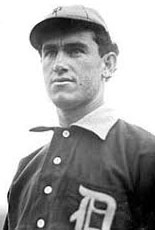
Matt McIntyre
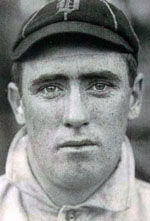
Donie Bush
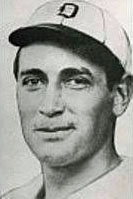
Ed Summers
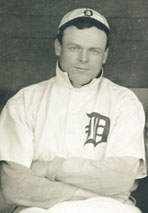
Jim Delahanty
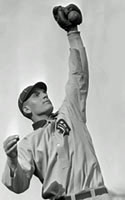
George Moriarty
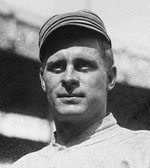
Rube Oldring
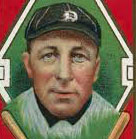
Tom Jones
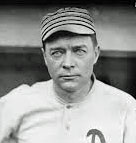
Harry Davis
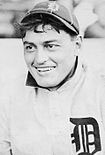
Charles "Boss" Schmidt
|

George Mullin |
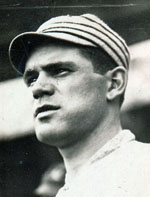
Danny Murphy |
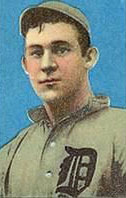
Oscar Stanage |
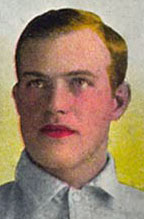
Harry Heitmuller |
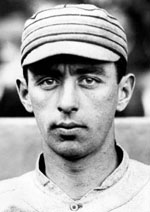
Jack Barry |
|
Postscript
- The Tigers bounced back the next day with a 5-3 victory, Cobb getting two singles in three ABs.
- Needing to win three of four to gain any ground, the A's won the next two, 2-0 and 4-3.
- Cobb ended the series 4-for-14 with a walk and only one run scored.
- Their lead cut to two games, the Tigers continued their lengthy road trip, playing 17 of their last 18 games on the road (including the A's series). But they managed to increase their final margin to 3.5 games over the Athletics.
- Detroit lost the World Series to the Pittsburgh Pirates in seven games.
|
|